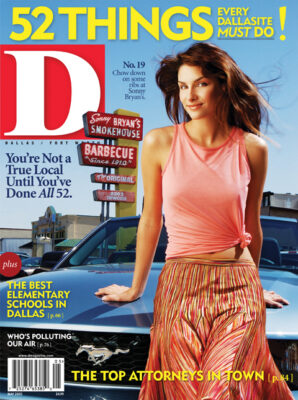 Dallas City Councilman James Fantroy says you just can’t trust his old pal Al Lipscomb, who’s challenging Fantroy for the District 8 seat in the May 7 election. “But it won’t matter” Fantroy says. “I’m going to beat him like an old country mule.” Well, maybe. But the 79-year-old Lipscomb has been kicking around Dallas politics for decades, first as a civil rights activist, then as a 14-year member of the City Council. That fire in the gut has never left him–not after his many victories or his numerous scandals. We sat down at his kitchen table to talk about old times and new.
Dallas City Councilman James Fantroy says you just can’t trust his old pal Al Lipscomb, who’s challenging Fantroy for the District 8 seat in the May 7 election. “But it won’t matter” Fantroy says. “I’m going to beat him like an old country mule.” Well, maybe. But the 79-year-old Lipscomb has been kicking around Dallas politics for decades, first as a civil rights activist, then as a 14-year member of the City Council. That fire in the gut has never left him–not after his many victories or his numerous scandals. We sat down at his kitchen table to talk about old times and new.
Rowlett: Councilman Fantroy is a protégé and old friend. Why are you running against him?
Lipscomb: It’s not about friendship. It’s about leadership. I’m not running against Mr. Fantroy. I’m running for District 8, and there are six of us in that race. Three of us sat on his boards or commissions. And when I was on the council, he sat on my boards.
Rowlett: But he says you looked him in the eye and promised you wouldn’t run against him.
Lipscomb: When he first heard I was going to run, he said, “Al, my wife cried all night, and my son looks up to you.” He really pushed a guilt trip on me on that one. And I said, “Well, I’m not going to run.” But then, at a City Council briefing, I told him it was my right to run, and to change my mind and reapply.
Rowlett: Can you ever be friends again with Mr. Fantroy?
Lipscomb: Sure I can. But this is the democratic process. In America, we do run for a seat. Sometimes, people become very angry because you run, but that’s the process. You know, I’ve been running since 1969, but I didn’t win until 1984. I knew very well I couldn’t beat some of the people I ran against, but I never became angry. I ran anyway to get the issues out. That’s why I ran. That’s why I’m running. But at first I wasn’t going to. I was getting phone calls from people urging me to run, but I said I’d be supporting Mr. Adrian Drake, who is coming on. You’ll be hearing more about him.
 |
| AL, ABOARD: The 79-year-old former councilman wants his job back for a simple reason. “It’s about leadership,” he says. |
Rowlett: So you weren’t going to support Councilman Fantroy, anyway?
Lipscomb: Let me level with you. Mr. Fantroy is a good man. He’s outspoken. But how could four African Americans and three Hispanics allow one woman to become a strong mayor by default? Jerry Jones wanted to bring the Cowboys back to Dallas. Stephen Jones said come on and work with me. Those Council members should have been concerned. But they let one woman–well, two women with [Dallas County Judge Margaret] Keliher–keep the Cowboys out of here. Just look at what having that team would have done for the economy.
Rowlett: You see a lack of leadership?
Lipscomb: Yes. When I was on the Council, we always knew where the votes were. We would count votes beforehand and we most always got our important issues passed. They didn’t count the votes. Now this person [Mayor Miller] capitalized on all of that. She saw that fragmentation and utilized it. She said, “I’m dissatisfied with the city manager.” And the next week, “I’m dissatisfied with the Chief of Police.” And it all started going downhill.
Rowlett: Are you against a strong mayor concept, or just against Laura Miller?
Lipscomb: I don’t want to see any changes in 14-1 and the system in place now. Look, you can’t have the mayor directly over the police chief without politicizing the police department. Keep the city manager. Keep that barrier there. Don’t politicize these city departments.
Rowlett: So you wouldn’t change anything?
Lipscomb: Sure, we need to tweak some things. But after all this time with the city manager, this one mayor is the only one to come along and cause all this dissension. We have bigger problems.
Rowlett: What are they?
Lipscomb: Crime is our biggest problem. We have 151,709 people in TDC as of the end of February. It cost over $2 billion dollars just to house them for one year. And these fellas are returning here everyday. They’ve been in prison getting meaner, and they come here and can’t find a job. We’re just turning them loose on the populace. Then we have 15 people on that Council that we’ve elected, along with our county commissioners and state representatives. And they aren’t working together to come up with any type of a program to train these people. Where is the vision? On top of that, you have people crossing our borders coming into this country and into this city, and they can’t find jobs. And no one has any vision. And that’s a major problem, and it causes crime. And on top of that, we have found our own weapon of mass destruction right here, and it’s crack cocaine.
Rowlett: How would you fix it?
Lipscomb: You have to get these entities working together. Get Senator Hutchison, get the county and the city and state and let’s get together a blue ribbon panel and solve this problem. Crime leads to a declining tax base. If people can get away from crime, they will, they’ll move. And no business is going to locate in an area of high crime where they don’t feel safe. They’ll go to Oklahoma first. You know, I hear people talk about affordable housing. I’d like to see affordable housing, too. But you can’t get it because of a declining tax base, and that’s caused by crime. It eats away at this city like a cancer.
Rowlett: One of the things you recently took heat over was that appearance before the Council when you likened the strong mayor movement to Hitler…
Lipscomb: I never used “Hitler.” I just said that the Holocaust had to start somewhere. I was talking about giving a person too much power. I was drawing a parallel, but I never used the word “Hitler.” What we’re doing here is giving a person too much power unnecessarily. But I guess I did go over, and I apologized immediately. It was a poor choice of words.
Rowlett: If you are elected, could you work with Mayor Miller?
Lipscomb: Sure I can work with her. I don’t dislike her personally, although I don’t like some of the things she’s done–railroading Chief Bolton, for instance, and the way she used to talk to Ron Kirk when he was mayor and we were on the council. And I sure don’t like this strong-mayor idea. But I’ll tell you one thing: the City Council better start working together. We need to put these petty ego problems aside and work for the City of Dallas.
Rowlett: With your concerns, why not run for mayor?
Lipscomb: I could have and I should have. But it just takes too darn much money.
Rowlett: How much money will it take for you to win in District 8?
Lipscomb: About $22,000. I have name identification, but I am not the incumbent, so I’ll be asking those who give to Mr. Fantroy to save some for me, too.
Rowlett: Are you running partially to restore your name after being accused of accepting bribes from Yellow Cab?
Lipscomb: Yes. You know, that whole thing was flawed. It was overturned because they stuck that trial up there in Amarillo where I could not get a jury of my peers. They went to 27 rural counties to pick a jury. Not one person of color. I wonder why no one has pursued how that happened? Railroading me like that.
Rowlett: But you never denied taking money from the cab company.
Lipscomb: I was asked to work as a consultant for that company, and I said I would, but at that time that I said I’d do it, I was off the City Council. You know, I always fought Yellow Cab. They were racist. They wouldn’t even stop for us. The owner was brought by my house, and he said they had new vision, that it wasn’t going to be like that anymore. He asked me if they could hire me to work with them to help change the image in the southern quadrant. And reluctantly, I said yes. That’s how I got on that payroll.
Rowlett: But you got back on the Council…
Lipscomb: I got back on the Council and it never changed. I just didn’t report it, but that was the only thing. And when votes came up on Yellow Cab, I recused myself from voting. But it was the appearance.
Lipscomb: I was so stressed. That Amarillo thing swamped me. But you know, it was a blessing in disguise. In those two years that I was here, I got two bikes, and people came here to my house and gave me a diet–a Muslim diet I guess–and I stayed on it. It brought my diabetes down. The only thing is, I’ve got a cataract on this left eye. I feel good, thanks to the Good Lord. Here, feel that muscle. (Gestures to his arm.) I also come from good genes. My mother lived to be 101. There’s long life in my family. And I hope to be around for a while.
Get our weekly recap
Related Articles

Methodist Charlton Names New CEO and Steward Offloads Five More Hospitals for $1.1 Billion

What We Saw, What It Felt Like: Stars-Golden Knights, Game 1



